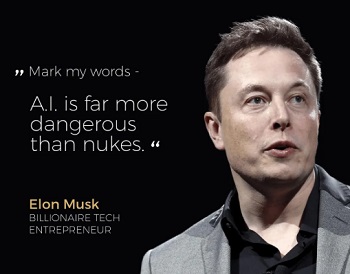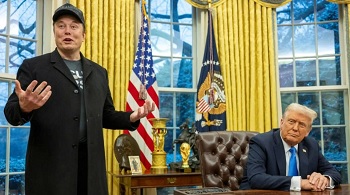Social-Political Issues
 |
 |
 |
 |
 |
 |
 |
Elon Musk Is Instituting Technocracy
We are presenting this article to our readers because it is rare to find someone like Tom Valovic, who takes an out-of-the-box position to alert us about the dangers of a transformation taking place before our eyes, seemingly unnoticed.
The current form of government – an indirect democracy through our republican tri-branch system – is on the way to becoming a technocratic system directed by a few gurus specialized in sophisticated electronic technology. The pretext is to end corruption and make production more efficient. The end is the installation of a technocrat authoritarian regime.
TIA does not agree with every paradigm Valovic adopts, such as his ideal of equality for society or his take on "climate crisis"; but his crystal clear insight is a precious tool that TIA readers might use when evaluating the lightningt speed changes we are witnessing in our country and in the world. – The editor
What Musk is doing is tantamount to hacking the inner core of the federal government and the public trust – a blatant coup and power grab for technocratic ends.
It’s hard to see articles about the “move fast and break things” approach of the Trump administration without also hearing about the hovering presence of the world’s richest man, technocrat extraordinaire Elon Musk. The mainstream media likes to describe Musk primarily as an oligarch.
His involvement – which now includes having a desk in the White House – is a rather alarming event and something hardly anyone expected. Unfortunately, most media reports are lacking an important perspective about this unexpected bestowal of political power to him and other technocratic oligarchs. Is this a deliberate omission or do many media outlets simply have blinders on because, in their perception, Big Tech is now fundamental to Wall Street’s economy and national security?

Protests against the great power entrusted to Elon Musk are already taking place
In the case of the media, journalists often appear to be enmeshed in worldviews more appropriate to the late '90s than the complex and often baffling world picture we see today. Many articles about Musk focus on such issues as the legality of the Department of Government Efficiency (DOGE) and the serious conflicts of interest that exist.
Then, of course, there’s the sheer insanity of handing over the keys to the kingdom to a small group of computer tech bros inexperienced in matters of state who appear to have not been properly vetted or advised of existing privacy law and national security protocols. The idea that these individuals now have access to troves of the personal data of U.S. citizens is simply beyond comprehension. Still, while these are legitimate concerns, the larger implications for technocratic management are getting bypassed.
The advent of the technocratic state poses a clear and present threat to democratic norms. But in the early days of his presidency, Donald Trump has opened the door wide to its instantiation, first with the public announcement of a $500-billion joint AI development effort, with Oracle CEO Larry Ellison and AI front man Sam Altman accompanying him on stage.
I’ve written previously about the lack of technological sophistication possessed by the average member of Congress and how this is a deep concern. This knowledge gap creates a power vacuum that’s being fully taken advantage of by wealthy and powerful unelected technocrats who are at the forefront of accelerationist-style AI development.
A runaway freight train
Is there anything that can stop this runaway freight train from running over the needs and rights of the public and constitutional norms? We’re all now highly dependent on phones and computing devices to carry out even the simplest of tasks in the course of everyday life. This life-limiting technological dependency represents a fundamental means of shifting power and control to elites who have the tech-based sophistication and infrastructure to leverage that control for their own advantage, facilitating a behind-the-scenes transfer of money and power up the food chain.
To think that Musk is motivated to “help out” with this internal nation-building would be naïve. As Anna Weiner wrote in a recent New Yorker article, “Tech executives see an opportunity to shape the world in their image.” Musk became the world’s richest individual only through a laser-like focus on self-interest and various questionable vanity projects.
What’s also concerning is that this power shift toward a technocratic state is happening merely in the first few months of Trump’s presidency. Was this the president’s Reaganesque answer to making things more affordable or is it a cynical bypass of those campaign promises?

Musk admits the grave dangers of AI, yet still pushes for its furthest development
For example, AI’s insatiable need for electric power has been a key factor in the triumphant rebranding of nuclear power as a “green” technology. The most salient example of this is Microsoft’s intent to use the Three Mile Island nuclear plant to power its AI farms. As for wealth inequality, it seems clear that AI is already widening the divide between the economic classes. And, domestically and no doubt also in China and Russia, one of the most prominent uses of AI has been to provide new capabilities for drone attacks and nuclear warfare.
Onward into the Fog
The first step toward counteracting these trends would be to better educate both Congress and the public about the still poorly understood dangers of a technocratic state which heralds further fusion of corporate and government power (historically, a hallmark of authoritarianism). In a way, this is a nonpartisan issue because Democrats have made their own contribution to cozying up to Big Tech’s plans for our future over the years. One possible small step might be for Congress to re-fund the Office of Technology Assessment. While this is hardly a panacea, providing more tech savvy advice to Congress would be a move in the right direction and might serve to balance the advisory data provided to the White House by the Office of Science and Technology Policy (OSTP).
We have yet to hear of anyone in Congress, Democrat or Republican, stepping up to warn about the dangers of technocracy, not just as a political phenomenon but also as a social and quality of life issue. Most likely, both high-profile media outlets and Congress are sidestepping this issue with a kind of strategic incompetence in order to support the powerful economic interests represented by their Big Tech donors.

Trump has allowed Musk to insert himself into the highest levels of government
Finally, it’s worth asking if Donald Trump fully understands the constitutional implications of opening this Pandora’s box. In terms of existing guardrails, he either turned Musk loose knowingly or unknowingly. But it doesn’t matter – both scenarios are equally troubling. Regardless of the outcome of pending and future court cases, we should all be forewarned that 2025 is rapidly shaping up to be the year we lost our civil liberties and protections (and our country as we know it) to AI and the Technocrat-in-Chief, Elon Musk.
Read other articles by Tom Valovic here
Posted February 19, 2025

______________________
______________________
 Volume I |
 Volume II |
 Volume III |
 Volume IV |
 Volume V |
 Volume VI |
 Volume VII |
 Volume VIII |
 Volume IX |
 Volume X |
 Volume XI |
 Special Edition |


